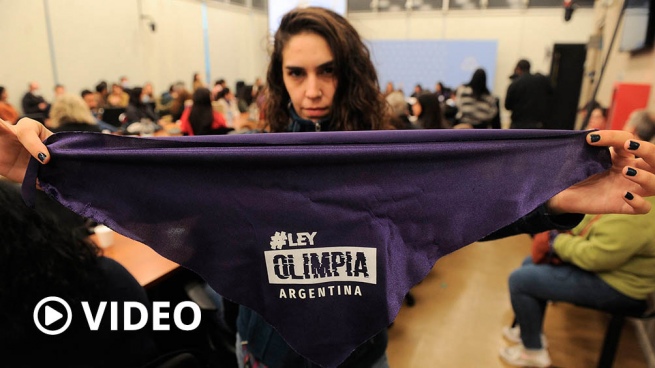The deputy of the Front of All Monica Machatogether with the Minister of Women and Diversity Elizabeth Gomez Alcortathe space of victims “Olimpia Argentina Law” and the organization Gender and ICT, presented this Monday two projects to reform the Criminal Code and the Gender Violence Law, to classify the figure of digital violence as a crime.
These are two bills, one called the Olympiain recognition of the Mexican activist Olympia Coral Melor, which proposes to reform the Gender Law, and another called Beleninspired by the case of Bethlehem San Romanwho was induced to suicide after suffering non-consensual dissemination of intimate material.
The presentation was made during an act in the annex building of the Chamber of Deputies, with the assistance of the Minister for Women, Elizabeth Gómez Alcorta; the Mexican activist Olimpia Coral Melo; Belén’s father, Marcelo San Román; Florencia Zerda, from the Gentic group; Paula García Rey, from Amnesty International; and the Public Defender, Miriam Lewin
“We must work on digital violence, understanding it as a form of violence against women”Macha said upon opening the act and highlighted that one of the bills proposes incorporating it “as a crime in the Penal Code.”
This will allow “having digital evidence as a crimesince it implies that those who film or record women’s bodies in a situation of intimacy without authorization are sanctioned, as well as those who upload it to the networks and those who spread it,” he said.
The penalties will be aggravated when those responsible are ex-partners, or if the victim is a minor, or when it was used for profit, he added.
One of the projects is called Belén “because we want to honor the young woman from Bragado who was the victim of digital violence because her ex-partner made the decision to upload her image without consent,” she explained.
“There is a shared responsibility” between those who made the decision to publish the image and those who spread it, he added.
Also, he said that the Olympia law “seeks to include digital violence as another type of gender violenceor, that it is a sample mother law” and that actions can be generated “to work on prevention in all areas”.
In turn, he stated “very optimistic” in which they can “build consensus to be able to sanction these projects” .
Meanwhile, Minister Gómez Alcorta congratulated Macha “for taking up this flag, which is essential for these times, since it is a necessity and there is a vacancy on the part of the State regarding a reality that began to leave, as on other occasions, of being in the private sphere”
I participated in the presentation of the “Olimpia” and “Belén” bills, which seek to recognize and prevent digital violence against women and LGBTI+ to improve state responses. pic.twitter.com/IbsfC4kFrQ
— Eli Gomez Alcorta (@EliGAlcorta) July 11, 2022
“Gender-based violence in digital environments is one of the great issues of this time on the agenda, but the State comes after the needs and you know that gender-based violence began to be given a name, and that that began as violence against women was domestic violence,” he said.
The official added that, with the regulations in force, “an extortion is an extortion, and the means does not matterbut, as usually happens in issues of gender violence, it is very difficult for judicial or state officials to have the capacity to hear that in this practice there is extortion of women and LTGBI groups.”
Meanwhile, one of the main speakers, the Mexican activist Olimpia Coral Melo, pointed out that “this is not an issue of a political party, it is an issue where we should fill not only these Congresses and auditoriums, all the deputies should have been here and deputies, to put aside their machismo and their misogyny”.
“It is useless for a deputy to raise his hand for the Olympia Law or the Belén Law if they have our naked bodies on their cell phones,” he added.
“An extortion is an extortion, and the means does not matter.”Elizabeth Gomez Alcorta
He also emphasized that “every time – deputies, the media and men in general – spread our photographs, they violate our bodies” and clarified “they do not need to have our physical naked bodies to rape us.”
For its part, florence zerda, author of the book Violence of Digital Gender, pointed out that “from feminism we not only seek the punishability of behaviors, we must work with educational public policies, but in the meantime we cannot let the victims continue to suffer the consequences they suffer ”, emphasizes the lawyer”
“they have been presented more than 25 projects in Congress to penalize the dissemination without consent of intimate materialToday, none of them prospered and that’s crazy,” he added, noting that the UN asked Argentina “to make laws in accordance with this issue and with a gender perspective.”
For his part, Belén’s father, Marcelo San Román, said that “it is difficult to speak from pain and honor the memory of my daughter” and that it is necessary to pass a law so that this “does not happen to any other girl.”
“Viralization causes a lot of psychological damage and my daughter could not bear to see her body and identity on different networks,” she added.
?? We want to live freely and be able to enjoy our sexuality!
today together with @OlimpiaCWomanMexican activist, and @EliGAlcortaminister of @MinGenerosARwe present this afternoon a legislative proposal against digital violence.
More info: https://t.co/WwYdQfWGBj pic.twitter.com/YL69UV3w3O
– Monica Macha (@MoniMacha) July 11, 2022
During the act, victims of digital violence and the representative of Amnesty International, Paula García Rey, also spoke.
The project of the so-called “Bethlehem Law” seeks the incorporation into the Argentine Penal Code of the crimes of obtaining and disseminating intimate material and/or nudity, “porn deep fake” and the so-called “sextortion” without consent.
It establishes that “prison from three months to two years and double the fine established in article 155° will be applied to whoever, by any means, without the authorization of the victim or through deception, videorecords, audiorecords, photographs, films or elaborates, documents with content of nudity, sexual nature or explicit sexual representations”.
Likewise, it provides that “prison from three months to three years and double the fine established in the previous paragraph will be applied to whoever, by any means, and without the victim’s authorization, disseminates, publishes, sends or in any way makes available of third parties the documents referred to in the preceding paragraph obtained with or without their consent”.
According to the text, the penalties will be increased by a third when the crime is committed by a person through gender violence, or if the act is committed for profit; or for pleasure, greed, hatred of race, religion, gender or sexual orientation, gender identity or its expression or against a minor.
“The Olympia Law is a political movement in Latin America,” said activist Coral Melo
The Mexican activist against digital violence Olimpia Coral Melo said Monday that the Olimpia law is “a political movement” in Latin America so that women and girls can “also be safe on the internet.”
This was expressed when participating in the presentation of two bills against digital gender violence in Argentina, which took place this Monday, from 5:00 p.m., in the Chamber of Deputies of the Nation.
Coral Melo also expressed that this law is in honor of Belén San Román, the 26-year-old Argentine police officer who took her own life after her ex-partner made an intimate video viral, and whose father, Marcelo, was in Congress on Monday.
“Search the internet for naked women from Argentina and you will find 2,400 markets for exploitation in Buenos Aires alone, and in all of Argentina 30,000 markets for sexual exploitation, 98.2% of them are female victims perpetuated by men,” said the Mexican reference against digital violence.
The presentation of the “Olimpia Law” and “Bethlehem Law” projects was headed by the national deputy Mónica Macha and the Minister of Women, Gender and Diversity Elizabeth Gómez Alcorta.
Meanwhile, Coral Melo added that “this is not an issue of a political party, it is an issue where we should fill not only these Congresses and auditoriums, all the deputies and deputies should have been here, to put aside their machismo and his misogyny.”
“It is useless for a deputy to raise his hand for the Olympia Law or the Belén Law if they have our naked bodies on their cell phones,” he added.
He also emphasized that “every time – deputies, the media and men in general – spread our photographs, they violate our bodies” and clarified “they do not need to have our physical naked bodies to rape us.”
At that point, he stressed that “the virtual is real, it exists and it damages”, referring to the hashtag of the awareness campaign that he started in Mexico based on his personal experience.
In Mexico, he recalled, they started the fight in 2013 and the Olympia law was only approved in 2018: “We spent five years telling the deputies ‘the virtual is real,'” he added.
Olimpia also recalled in detail how her case was as a victim of digital violence, and that she tried to commit suicide three times for this reason.
In this regard, she pointed out that today “I am no longer Olimpia from that sexual video, today I am Olimpia from the Olympia Law” and highlighted: “all of you did me justice because when that happened to me it was not a crime ” and thanked being in Argentina for this cause.
“Fear changed sides and we are not going to allow it to happen to one more,” he added, and handed over 27,000 signatures from people in Argentina to Deputy Macha.
Women from the Olimpia Argentina Law Group also participated in the presentation, among others, who recounted their personal cases to show the “great damage” caused by digital gender violence, and highlighted Olimpia Coral Melo as a reference in this fight.
Melo is a Mexican activist who was the victim at the age of 18 of the dissemination of a sexual video by an ex-partner, which went viral without her consent.
When Olimpia sought access to justice, the authorities concluded that there was no crime to prosecute and, based on this fact, fought for the modification of regulations that punish crimes that violate the sexual intimacy of people through digital means.
She was selected by Time magazine as one of the 100 most influential people of 2021 for her leadership in combating cyber sexual harassment.
The “Olympia Law” does not refer to a law as such, but to a set of legislative reforms aimed at recognizing digital violence and punishing crimes that violate the sexual intimacy of people through digital means, also known as cyberviolence.
Olimpia founded the National Front for Sorority, and the site defendersdigitales.org whose main objective is prevention, action and advocacy on digital violence.
Meanwhile, from Defensoras Digitales they provide training to schools and public and private institutions in order to create safe spaces on the internet.
As detailed on its website, its main objective is to promote, protect and guarantee the right of people to a cyber life free of violence based on the protection of dignity and Human Rights, in addition to disseminating and promoting digital culture with gender perspective.








